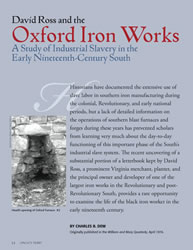Oxford Iron Works



The Ross Letterbook, which deals with operations at his Oxford Iron Works in Campbell County, Virginia, during 1812 and 1813, gives a remarkably full picture of slave working and living conditions at this installation and offers insight into a number of key topics, including the status of the black family in this industrial setting, the nature of the relationship between the ironmaster and his bondsmen, and the application and effectiveness of the employer’s various disciplinary and incentive techniques.
Abram, The Oxford Founder
Ross’s feelings toward his skilled slave artisans are most clearly revealed in his relationship with Abram, the Oxford founder. Ross considered Abram an exceptionally able iron worker, but his regard for him seems to have gone beyond simply an admiration of his abilities.
Entire article available only in printed version. Lynch's Ferry is on sale at the following Lynchburg locations: Bookshop on the Avenue, Givens Books, Lynchburg Visitors Center, Old City Cemetery, Point of Honor, Market at Main, and Lynch's Ferry office at The Design Group, 1318 Church Street, Lynchburg.
Abram, The Oxford Founder
Ross’s feelings toward his skilled slave artisans are most clearly revealed in his relationship with Abram, the Oxford founder. Ross considered Abram an exceptionally able iron worker, but his regard for him seems to have gone beyond simply an admiration of his abilities.
Entire article available only in printed version. Lynch's Ferry is on sale at the following Lynchburg locations: Bookshop on the Avenue, Givens Books, Lynchburg Visitors Center, Old City Cemetery, Point of Honor, Market at Main, and Lynch's Ferry office at The Design Group, 1318 Church Street, Lynchburg.
^ Top
Previous page: John Randolph and the Field of Honor
Next page: The History of Riverside Park
Site Map




